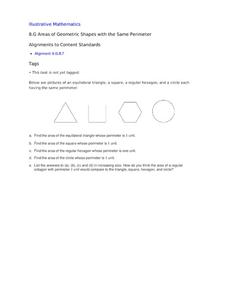Illustrative Mathematics
Finding the Line of Symmetry
Can you find the line of symmetry? That's what your students will demonstrate by completing this worksheet. The task gets increasingly difficult as shapes are included that have one line of symmetry, no lines of symmetry, and multiple...
Baylor College
Pre-Assessment: The Brain
Break your class in to the general structure and function of the brain. Brainiacs discuss what they know about it and create personalized brain development timelines. They also take a true-false, pre-assessment quiz to get them thinking...
Scholastic
Study Jams! Animal Adaptations
Physical and behavioral adaptations are discussed by two teen girls as monarch butterflies flutter by. They also describe the process of natural selection. With colorful animation and relatable teen language, learners are sure to adapt...
Howard Hughes Medical Institute
Got Lactase? The Co-Evolution of Genes and Culture
Does the human body evolve as quickly as human culture? With a stellar 15-minute video, explore the trait of lactose intolerance. Only about 1/3 of human adults seem to still have the enzyme lactase and therefore, the ability to digest...
Curated OER
The Effect of Natural Selection on Genes, Traits and Individuals
Rotating through five stations, evolutionary biologists explore the question of how changes in DNA facilitate the changes in a population over time. High-quality, colorful cards of animals, skeletons, skulls, and DNA sequences can all be...
Ed Galaxy
Amazing Angles
Three letter-sized mini posters can be displayed in your elementary geometry class when teaching about angles. One provides information about degree measurement and additive properties, and the other two define acute, right, obtuse,...
Institute of Electrical and Electronics Engineers
Sugar Crystal Challenge
Blow your learners' minds with a sweet lesson on nanotechnology that uses sugar to demonstrate the difference nanoscale surface area makes in dissolving and crystal formation. Plenty of supportive background information is read to...
Institute of Electrical and Electronics Engineers
Tinkering with Tops
Get kids' heads spinning by challenging them to design a top that will rotate for a minimum of 10 seconds without leaving a 30-cm circle. Groups of learners collaborate through a planning stage, testing stage, and evaluation stage. Some...
Curated OER
Areas of Geometric Shapes with the Same Perimeter
A triangle, square, hexagon, and circle all have a perimeter of one unit. Eighth graders must attempt to find the area of each and arrange them in order from least to greatest areas. A terrific task for applying four different...
Curated OER
Partitioning a Hexagon
The task at hand is to partition a hexagon into two, four, and eight congruent figures. Make sure to give your wizards a sheet of triangle grid paper on which to decompose the hexagons. Have them explain which rotations, reflections, or...
Curated OER
Flower Vases
Which vase holds more water: a cylinder, sphere, or cone? Figure out which should be used for your sister's birthday bouquet with this practical word problem.
Curated OER
Estimating the Mean State Area
Seventh grade statisticians randomly select five states and then determine the mean area. The class then works together to create a dot plot of their results.
Curated OER
7.RP Music Companies, Variation 1
We've got the beat! And your musically-minded mathematicians will tap their toes as they determine which music company would be getting a better deal based on their offers to buy out TunesTown. The topic is extended in an additional...
Curated OER
Sore Throats, Variation 1
Why does Nia's water taste saltier than Trey's if she put more into her cup than he did? Math masters set up proportions in order to compare the mixtures. This task effectively has learners apply the concepts of ratio and proportion to a...
Curated OER
7.RP Music Companies, Variation 2
Real-world multiple-step proportion problems are sometimes hard to find for your math class. Here is one designed specifically to meet that need. Learners use proportional relationships to determine price per share in the acquisition of...
Curated OER
How Fast is Usain Bolt?
Revisit the 2012 Summer Olympics by having seventh graders calculate the unit rate sprinting speed of the 100-meter gold medal winner.
Howard Hughes Medical Institute
The Making of the Fittest: Natural Selection and Adaptation
The pocket mouse can be light brown like the sands of the desert, or dark brown like the volcanic lava flows that are interspersed throughout New Mexico's Valley of Fire. It seems that predators have weeded out light colored mice in this...
Howard Hughes Medical Institute
The Making of the Fittest: Natural Selection in Humans
Sickle cell disease only occurs when both parents contribute the trait, and mostly in those of African descent. Where did it come from? How did it evolve? Tony Allison, a molecular biologist, noticed a connection between sickle cell and...
Texas State Energy Conservation Office
Investigation: Oil Recovery
Energy conservers investigate gravel size to discover if it impacts the amount of oil recovered in the extraction process.
Texas State Energy Conservation Office
Investigation: Conservation of Energy
By rolling marbles down a six-foot length of track, physical scientists determine how much energy is lost to heat. It is recommended that you opt for the foam pipe insulation track because more friction slows the marble, allowing...
Texas State Energy Conservation Office
Investigation: Acceleration
Take a look at acceleration within the context of automotive technology. They vary the mass on a toy car and run it down a ramp, exploring Newton's second law of motion. Though this is a classic lab activity, you will appreciate the...
Scholastic
Study Jams! Addition & Subtraction of Decimals
So current with preteens is the topic of downloading tunes into their computers! In a relatable lesson, viewers are taught to figure out if Zoe can afford to purchase two songs if she has $3.00 left to her credit. Mia talks them through...
Scholastic
Study Jams! Compare Money Amounts
Elementary money makers are walked through five steps to compare two different amounts. RJ speaks slowly as animations display his explanations. He compares the price of a New York magnet to the amount of money his cousin has on hand to...
Scholastic
Study Jams! Multiplication of Decimals
How do you handle a decimal point when it appears in a multiplication problem? The answer is explained with a captivating and interactive slide show.





















